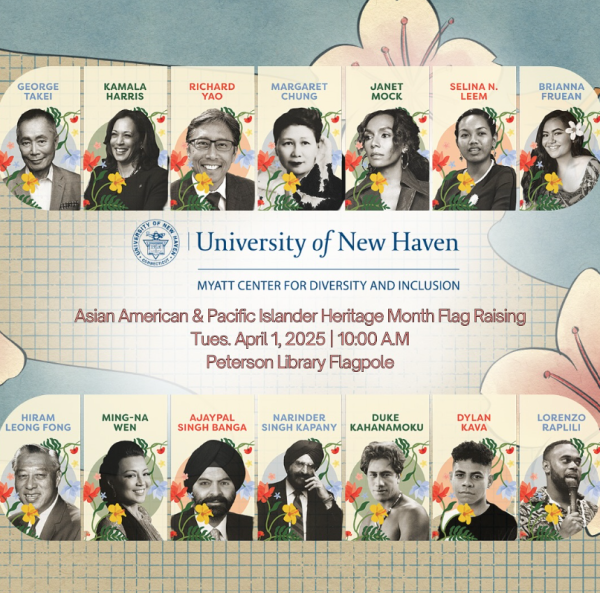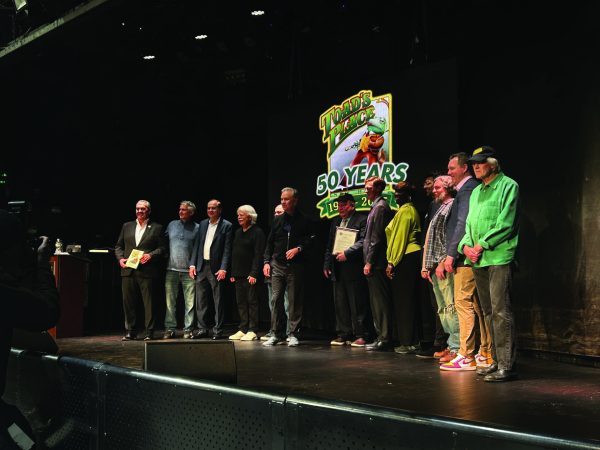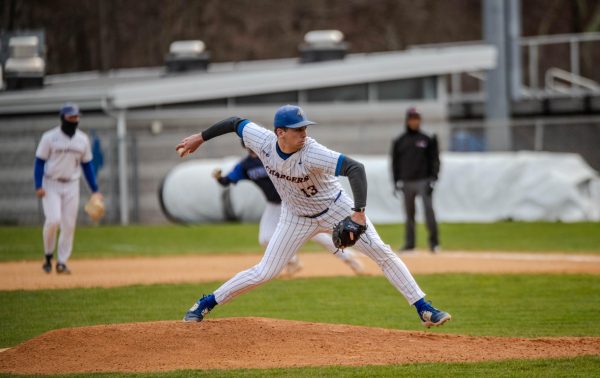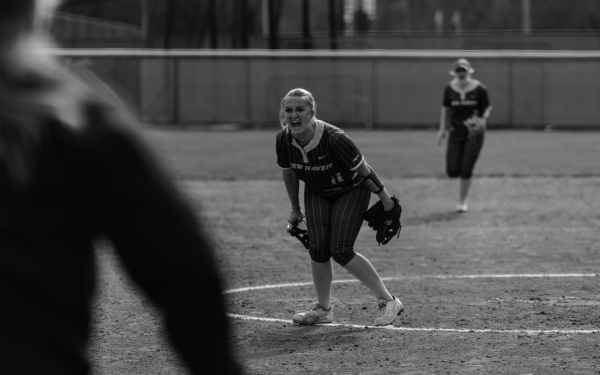Myatt Center’s upstander walk combines activism with activity
Photo courtesy of Charger Bulletin/Sadara Funches.
The Charger community embarks on their walk across campus, West Haven, April 14, 2023.
It was the hottest day of the year so far, with serene blue skies overhead and not a cloud in sight, when the Myatt Center for Diversity and Inclusion entreated the campus community to participate in their annual upstander walk last Thursday. The upstander walk was first held in 2016 and offers students, faculty and staff an opportunity to join in solidarity to learn how they can assist in the many fights against injustice.
The stroll began in front of the Marvin K. Peterson Library; guests journeyed around campus as they made stops along the way to hear from a variety of speakers in front of the admissions office, by the Charlie the Charger statue, in the Sheffield Hall gazebo and in front of the Myatt Center, where a concluding luncheon was held.
The first speaker was Timothy Prince, coordinator for leadership at the Myatt Center. Prince, who organized the upstander walk this year, and defined it as “a meaningful event meant to recognize the efforts made by individuals, organizations and departments in and around the campus community to promote unity and inclusion.” With its primary goal being to spread awareness about social issues pervading through our society, Prince highlighted the symbolism of the walk as an important takeaway.
“I think that symbolism means a lot,” he said. “I think that even if we’re not all paying a certain amount of money towards a certain organization or cause, just for the sake of taking the time out of our day to put effort and time into a cause like that, I think it makes a big difference… [This walk] was a symbolic representation, but also physically being able to see everybody wanting to participate in this, wanting to all stand behind something collectively, I think is a big impact that the university could catch onto.”
Ashley Dunn, assistant dean of student support, was introduced as the next guest speaker. She emphasized the role of choice between being a bystander and an upstander. It is often difficult to insert yourself in a situation which demands your attention and be an upstander, but that pales in comparison to the uncomfortability of the person whom you’d otherwise be ignoring as a bystander. Dunn called on the words of Holocaust survivor Elie Weisel when she said, “What hurts the victim most is not the cruelty of the oppressor, but the silence of the bystander.”
There are many ways in which one can define an upstander, but Interim President Sheahon Zenger seemed to invoke Occam’s razor as he offered perhaps the simplest and most all-encompassing answer imaginable: an upstander, at its core, is a friend.
“What if we just treated everyone as a friend?” Zenger said. “And what would a friend do in situations like we’re talking about? We’d be an ally, we’d be an upstander, we would connect and we would help… I know I may sound like a corny old guy saying this, but what if we just embraced love? Love and friendship; wouldn’t this all just be a better place for all of us? And isn’t that kind of what this upstander walk is all about?”
The upstander walk then officially began in front of Anemone and Steven Kaplan Hall. Mary Lippa, a senior psychology major, spoke about the discrimination, hardship and bias that affects the queer (and specifically the transgender) community across the world today and how the university can do better to protect all of its members. She also provided examples on how painfully easy it is to be an ally, saying, “Using correct pronouns is suicide prevention… Access to gender-affirming care is suicide prevention.”
A study conducted by the Minnesota Department of Health reported that “transgender and nonbinary youth who reported having pronouns respected by all the people they lived with attempted suicide at half the rate of those who did not have their pronouns respected by anyone with whom they lived.” And a study conducted by The Trevor Project revealed lower percentages of adolescents who considered or attempted suicide after receiving gender-affirming hormone therapy (GAHT) than those who sought GAHT and did not receive it.
The next stop along the route was the Charlie the Charger statue where Cora Cogill, a senior business management major, spoke on behalf of the Undergraduate Student Government Association (USGA) about sexual harassment and violence. She cited the National Sexual Violence Resource Center statistics that found 43% of men and 81% of women, including one in four undergraduate women at 33 of the nation’s major universities, will experience sexual assault, harassment or misconduct. Cogill continued to acknowledge “the higher risk that gender- and sexual-minority groups face” with these issues.
Albi Beshi, a clinician at the university’s Counseling and Psychological Services (CAPS), spoke in the Sheffield Hall gazebo about human nature and how being a bystander can be seen as the “default” human setting. He asserted that you must be active in standing up for those who may be unable to stand up for themselves as opposed to retreating to that safe feeling on the sidelines.
“But the unfortunate reality of our world is [that] so many of our peers, so many of our friends, family, neighbors, loved ones, coworkers, colleagues live in unsafe worlds,” Beshi said. “So it’s an unfortunate dynamic of human nature to prioritize safety when others are unsafe.”
The final speaker of the morning was Dean of Students and Vice President of Student Affairs Ophelie Rowe-Allen, who stood in front of the Myatt Center as she thanked Prince, Dunn and the rest of the speakers of the day, and implored attendants to share their stories over lunch in order to grow the upstander movement one conversation at a time.
“We must stand in solidarity with each other here in the Charger community,” Rowe-Allen said. “So what I’m encouraging you all to do is to stay a few more minutes, and if you could continue the conversation, right, you may have stories to tell… what you have learned today, we want to sprinkle it all around, right, and spread it and let it grow so that others may be able to see the work that we are doing here on the University of New Haven campus.”
The upstander walk was successful in continuing these conversations while evoking emotional and thoughtful responses out of those in attendance. Sankofa Benzo, a senior cybersecurity and networks major, drew upon similar motivations as Zenger with her definition of an upstander.
“Empathy,” she said. “I think oftentimes we focus on the courage and strength of those who have been upstanders for us, but seldom do we acknowledge their empathy. In the face of injustice and discrimination, the cruelty of the world feels suffocating so having someone with acute awareness and sensibility can then help bolster your own strength and courage.”
Criminal justice professor Danielle Cooper drew her motivation to participate in the upstander walk from a couple different sources, saying, “I am inspired to participate in the upstander walk by the examples that my parents have set for me. They encourage me to build community and fight against injustice anywhere that I am. I am also inspired by the members of our campus, especially our students, who show up in support of [diversity, equity and inclusion] efforts in many different ways.”
The fight to dismantle hate is a constant one, and we cannot become complacent in our efforts to create a world which abides by the platinum rule. By advancing these discussions and offering a platform for people of marginalized groups to speak their truth, the upstander walk is an important event to foster a campus community that is determined to create a welcoming environment for all.







